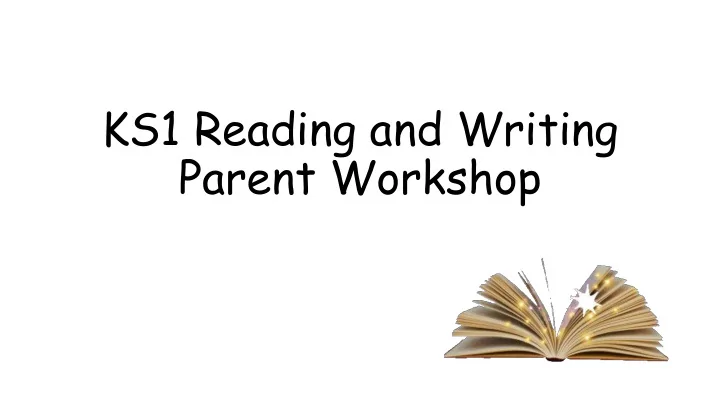

KS1 Reading and Writing Parent Workshop
Reading • What is phonics and how can I support with learning new sounds? • How is reading taught at school? • What do the colour bands mean? • How can I support with reading at home? • What should my child be able to do by the end of Year 1/2?
Why is it important to read at home? • Hearing your child read every day helps them with their decoding skills. • Reading stories to your children can help develop their love of reading and increases their vocabulary significantly.
Reading Bucket List Year r 1 Year r 2 Billy’s Bucket The Snail and the Whale Alfie and Annie-Rose Stories Suddenly The Gruffalo’s Child Tyrannosaurus Drip Dinosaurs Love Underpants Pig in the Pond Monsters Love Underpants Harry and the Bucket full of Dinosaurs Up and Down Ravenous Beast Voices in the Park Teeny Weeny Tadpole Smartest Girl in Town Some Dogs Do Once There Were Giants Beegu The Large Family Collection Mr Grumpy’s Outing The Cat in the Hat Lucy and Tom at the Seaside The Cat in the Hat Comes Back Lucy and Tom’s Christmas Who’s Afraid of the Big Bad Book Eric Carl Collection There’s a Wocket in my Pocket Farmer Duck Burglar Bill So Much Cops and Robbers Two Grannies The light House Keeper’s Lunch Collection Willy and Hugh Madeline in London Jaspers Beanstalk Winnie the Witch Collection Dogger The Zebra Who lost His Stripes Funny Bones Collection Not Now Bernard Look Out Suzy Goose Giraffes Can’t Dance Oops!
How we teach reading at school
“ Mmmmountain ” Maisy mountain, mountain
aw yawn at dawn aw
Reading or, oor, aw, ore
Home Learning
What do the colour bands mean? Pink Red Yellow are books for reception children Blue Green Orange are books for Year 1 children
Pink and and Red Books Some words can be sounded out. Some words the picture will prompt. S a m
What do the colour bands mean? turquoise purple gold are books for Year 2 children white lime copper are books for Year 3 children
Yellow and Blue books ow oa ur
Home Learning
Year 2 Year 2 start learning a spelling rule once they have finished RWI.
Writing • How can I support with handwriting at home? • What are fine motor skills and how can I support with developing my child’s pencil grip? • What should my child be able to do by the end of Year 1/2? • How is writing taught at school? • How can reading support my child’s writing?
What are Fine Motor skills? • Fine motor skills involve the use of the • smaller muscle of the hands, commonly • in activities like using pencils, scissors, construction with Lego or Duplo, doing • up buttons and opening lunch boxes. • Efficient fine motor skills require a number of independent skills to work together to appropriately handle the object or perform the task.
Fine Motor Skills
Pencil Grip How a child holds a pencil is also dependent on their age and the stage of their development.
3 Phase Approach to Writing
Learn a story through drama and immersion. Plan a new story based on the structure of the original story. Write the new version of the story .
Year 2 Expected Standard
Year 2 Greater Depth
Recommend
More recommend